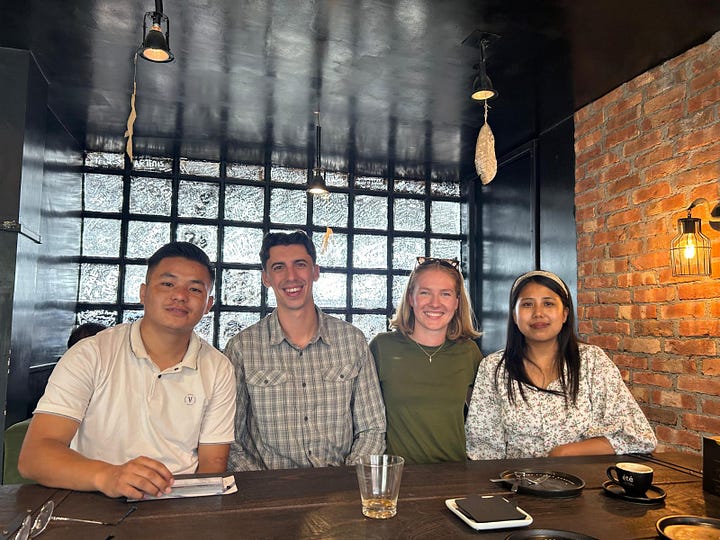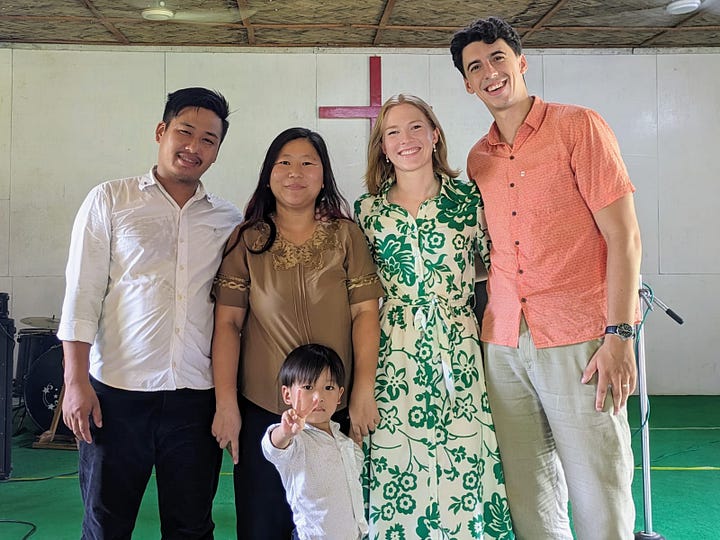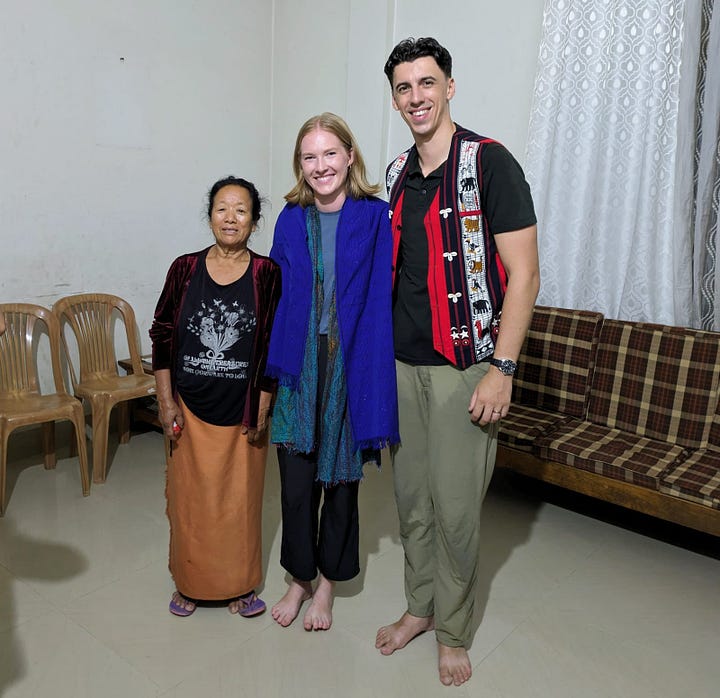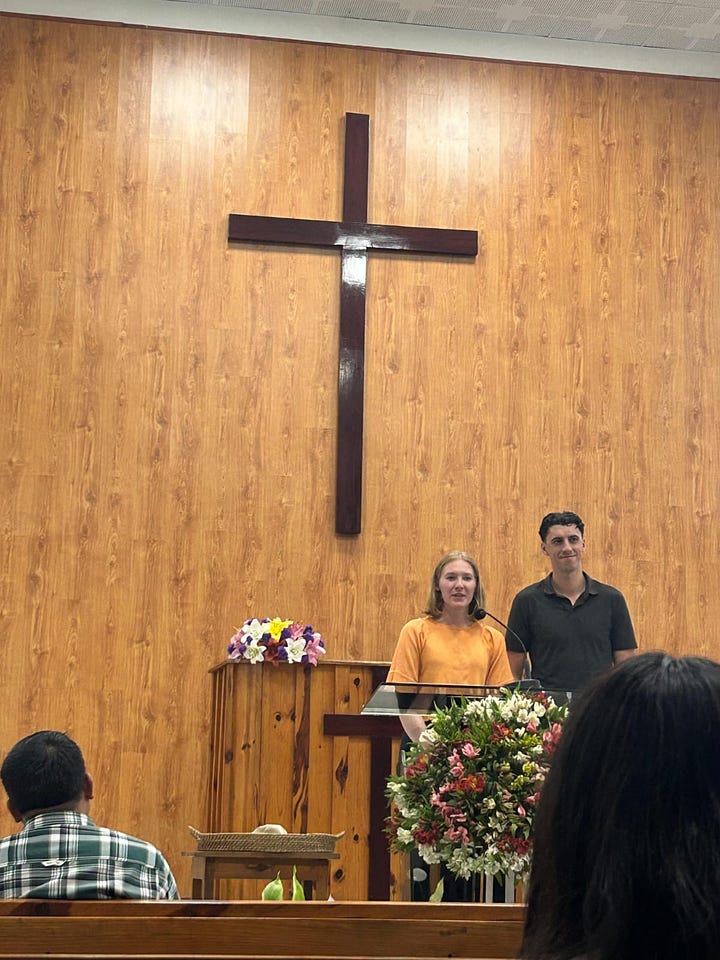What we learned in Nagaland
Unsurprisingly, there were lots of things we learned during our six weeks in Nagaland. If we let Him, God always has things for us to learn as He draws us closer to Himself.
During our time here, Alex’s mum shared the example of a statue being carved out of a block of marble and how that is a good picture for how God deals with us. We all would like God to add things to us because we feel inadequate, but God often wants to carve things away that we have added to ourselves – to reveal who we really are. The question is, will we yield to His hammer and chisel?
Accepting favours
It’s amazing we got this far into writing a newsletter without Alex referring to John Steinbeck, but there was a pertinent line in the book The Pastures of Heaven which Alex was reading and which stood out to us:
Within three months he had become a part of the valley, a solid man, a neighbour. He borrowed tools and had tools borrowed from him. At the end of six months he was elected a member of the school board… In addition he was a kindly man; he enjoyed doing favours for his friends, and, more important, he had no hesitancy in asking for favours. (emphasis added)
Reading these lines dovetailed nicely with something we grappled with in Nagaland – the overwhelming kindness and generosity people were showing us. As Steinbeck writes, an important aspect of being part of a community is not just doing them favours but also accepting favours from them. Especially when their culture is built around hospitality, as it is for the Nagas.
To give you an idea of the level of generosity we experienced, here is a short (and by no means exhaustive) list of the generous way people gave to us:
We were repeatedly provided with free lunch or dinner at the restaurant the youth pastor and his wife run (despite multiple attempts to pay or secretly leave money as we left).
We were welcomed into people’s homes for food and drink on so many occasions we lost count. This included being invited to family events and being asked to eat first as guests of honour and being cajoled to eat second and third helpings (as the more you eat the more you are showing your enjoyment of the family’s hospitality).
We were given gifts of jewellery and handmade traditional clothes, sometimes by people we had only just met.
We were picked up by young guys on scooters to help us get to church from the first apartment we rented, meaning they had to drive an hour each way to pick us up and drop us back.
We were connected with the dean of a theological college who offered us incredibly cheap accommodation.
We were treated to meals and coffees at restaurants and cafés.
All of this felt incredibly awkward because we were aware of being middle-class Australians visiting Nagaland, a corrupt state with high unemployment, and especially because the people we were involved with through the local church live in a low-socioeconomic area of Nagaland itself. Our instinct was to either refuse their generosity or to find some way of reciprocating, and especially not to ask for more favours!
But like Emma wrote in her earlier entry, ‘Human sympathy vs God’s love’, we are not called to have a transactional relationship with the other members of God’s church. After some strong words from the youth pastor and his wife about valuing hospitality (and after dwelling on the wisdom of Steinbeck) we stopped fighting or evading the favours people wanted to do for us, and instead focused on showing our deep appreciation for their kindness and love.
In God’s Kingdom, we are called to love and be loved. And sometimes, accepting another person’s love graciously can be just as loving as doing them a favour or giving them a gift. Learning this freed us to find ways to give to people in a way which was unburdened by obligation or guilt, but which was instead a free-flowing demonstration of love and care – which, in the end, is a much better reflection of God’s love.




Preaching
The youth pastor kept asking Alex to preach at the youth services he ran (two or three per week) and Emma was also asked to share our testimony or share words of encouragement at multiple services. While we are both used to talking with youth and speaking at church meetings, we don’t have much experience with formal preaching. So this was an opportunity to rely more on God, especially as we got to know the youth better and also came up against the limitations of the very formal services.
While we were in Nagaland, some friends from New Zealand recommended a book by the missionary E. Stanley Jones. When we looked him up, we came across this quote of his on his foundation’s website (from his book A Song of Ascents):
I knew that I was to be a missionary and an evangelist, but saw that many evangelists, after a few years of fruitfulness, end up quoting themselves and using phrases of sermons that may have been effective, but now are merely slick, like a coin from constant usage. The danger is that lacking a close-knit fellowship to discipline them, they (the evangelists) become dogmatic, cocksure, and wordy – they are telling others what to do but no one tells them what to do. (emphasis added)
The last sentence particularly stood out to us, because we realised that the only hope we had of staying reliant on God and the Holy Spirit in what we shared (instead becoming slick and practised) was to seek ‘close-knit fellowship’ with each other and with the youth pastor.
This led to us having more conversations with each other about what to share, spending more time with God to know what was on His heart, and also speaking with the youth pastor about what he thought – about what we were planning to say and also how he thought each service had gone. It wasn’t that we were seeking his ‘tick of approval’; instead we were wanting to open up conversations which could lead to more relationship and learning for all of us.


Sharing
Seeking the youth pastor’s input and sharing our own thoughts led to discussions about what the youth pastor wanted for the two distinct groups of youth that he leads (split by age and maturity) and what format would best serve his desire for them to continue developing in their faith. We told him about our own experience leading youth in Australia and how much we enjoyed just talking with them: encouraging them to share about their struggles and their doubts, helping learn how to be vulnerable and open with each other, and then building them up in their own relationships with God.
There is always a balance to be struck between respecting another’s traditions and having the boldness to suggest a different way. We didn’t want to come to a new place and assume that the way we are used to is the best one, but we also wanted to be sensitive to the Holy Spirit and express when we felt like there were opportunities for growth. Fortunately, the youth pastor was looking for that kind of ‘new growth’ and had already been wondering how to develop it.
This resulted in us leading a few informal times of personal sharing with the youth, which they responded to with equal parts awkwardness and openness. But we enjoyed just expressing what was on our hearts about how we can live out God’s commandment to “love your neighbour as yourself” (Matthew 22:39). God calls us to have fellowship with one another, not just friendship. This requires us to seek to know others and be known by them. Only then can we “...become mature, attaining to the whole measure of the fullness of Christ” (Ephesians 4:13).


